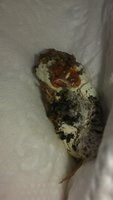Svaness
Songster
- Jun 26, 2018
- 120
- 186
- 127
Hi!
I posted a picture along with this but my camera quality isn't so great so I'll try to be descriptive. I have 2 6 week old pullets. Their behavior and habits are completely normal. I have however noticed some dropping that have some red/orange tinge. The entire stool is normal except for small bits of this coloured stuff. Could it be coccidiosis or cocci or is it just one of then shedding their intestinal lining? They eat a diet mainly consisting of chick starter with only spinach and little bits of grass as treat occasionally .
Any help here would be greatly appreciated ps. The ashes and hair is from the ground. I dropped the poop.:/
ps. The ashes and hair is from the ground. I dropped the poop.:/
I posted a picture along with this but my camera quality isn't so great so I'll try to be descriptive. I have 2 6 week old pullets. Their behavior and habits are completely normal. I have however noticed some dropping that have some red/orange tinge. The entire stool is normal except for small bits of this coloured stuff. Could it be coccidiosis or cocci or is it just one of then shedding their intestinal lining? They eat a diet mainly consisting of chick starter with only spinach and little bits of grass as treat occasionally .
Any help here would be greatly appreciated
 ps. The ashes and hair is from the ground. I dropped the poop.:/
ps. The ashes and hair is from the ground. I dropped the poop.:/



